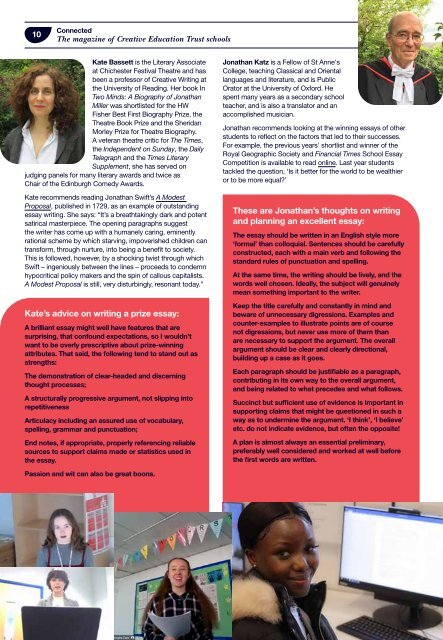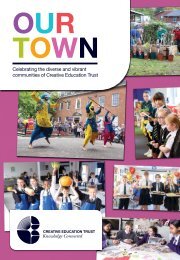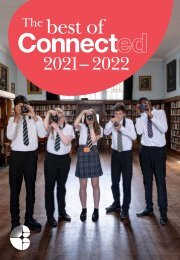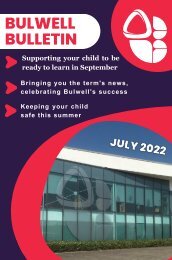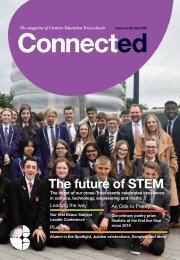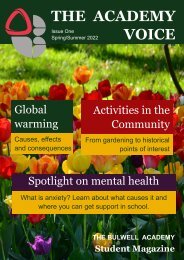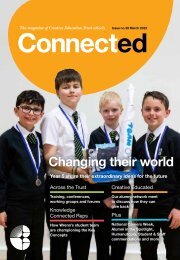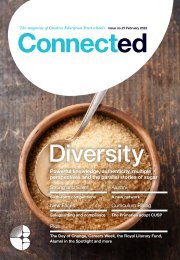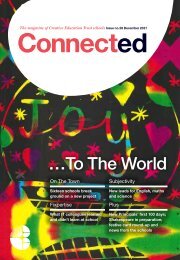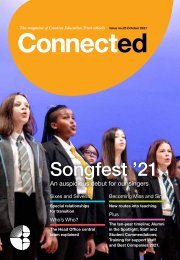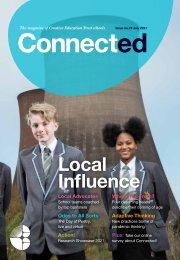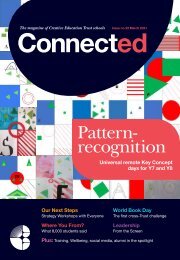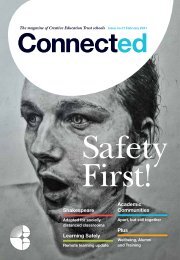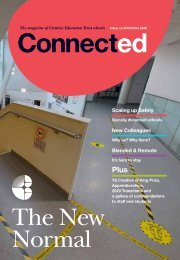Connected issue 20
The 20th issue of Connected: the magazine of Creative Education Trust schools. In this issue: • A report on the fantastic Sixth Form Prize finals for the Public Speaking and Essay competitions • Book recommendations from our primary school teachers, together with musings on what reading is good for anyway • Tips on setting up virtual lectures, and the experience of one music teacher creating online opportunities for his students
The 20th issue of Connected: the magazine of Creative Education Trust schools.
In this issue:
• A report on the fantastic Sixth Form Prize finals for the Public Speaking and Essay competitions
• Book recommendations from our primary school teachers, together with musings on what reading is good for anyway
• Tips on setting up virtual lectures, and the experience of one music teacher creating online opportunities for his students
You also want an ePaper? Increase the reach of your titles
YUMPU automatically turns print PDFs into web optimized ePapers that Google loves.
10<br />
<strong>Connected</strong><br />
The magazine of Creative Education Trust schools<br />
Issue no.<strong>20</strong><br />
December <strong>20</strong><strong>20</strong><br />
11<br />
Kate Bassett is the Literary Associate<br />
at Chichester Festival Theatre and has<br />
been a professor of Creative Writing at<br />
the University of Reading. Her book In<br />
Two Minds: A Biography of Jonathan<br />
Miller was shortlisted for the HW<br />
Fisher Best First Biography Prize, the<br />
Theatre Book Prize and the Sheridan<br />
Morley Prize for Theatre Biography.<br />
A veteran theatre critic for The Times,<br />
the Independent on Sunday, the Daily<br />
Telegraph and the Times Literary<br />
Supplement, she has served on<br />
judging panels for many literary awards and twice as<br />
Chair of the Edinburgh Comedy Awards.<br />
Jonathan Katz is a Fellow of St Anne's<br />
College, teaching Classical and Oriental<br />
languages and literature, and is Public<br />
Orator at the University of Oxford. He<br />
spent many years as a secondary school<br />
teacher, and is also a translator and an<br />
accomplished musician.<br />
Jonathan recommends looking at the winning essays of other<br />
students to reflect on the factors that led to their successes.<br />
For example, the previous years’ shortlist and winner of the<br />
Royal Geographic Society and Financial Times School Essay<br />
Competition is available to read online. Last year students<br />
tackled the question, ‘Is it better for the world to be wealthier<br />
or to be more equal?’<br />
Successes and special commendations<br />
Students…<br />
To Key Stage 3 students and the Art department<br />
at Ash Green, invited by the Bedworth Armistice<br />
Committee to exhibit artwork in commemoration<br />
of Remembrance Sunday at Bedworth Civic Hall<br />
in the absence of a<br />
parade this year.<br />
Kate recommends reading Jonathan Swift’s A Modest<br />
Proposal, published in 1729, as an example of outstanding<br />
essay writing. She says: “It’s a breathtakingly dark and potent<br />
satirical masterpiece. The opening paragraphs suggest<br />
the writer has come up with a humanely caring, eminently<br />
rational scheme by which starving, impoverished children can<br />
transform, through nurture, into being a benefit to society.<br />
This is followed, however, by a shocking twist through which<br />
Swift – ingeniously between the lines – proceeds to condemn<br />
hypocritical policy makers and the spin of callous capitalists.<br />
A Modest Proposal is still, very disturbingly, resonant today.”<br />
Kate’s advice on writing a prize essay:<br />
A brilliant essay might well have features that are<br />
surprising, that confound expectations, so I wouldn’t<br />
want to be overly prescriptive about prize-winning<br />
attributes. That said, the following tend to stand out as<br />
strengths:<br />
The demonstration of clear-headed and discerning<br />
thought processes;<br />
A structurally progressive argument, not slipping into<br />
repetitiveness<br />
Articulacy including an assured use of vocabulary,<br />
spelling, grammar and punctuation;<br />
End notes, if appropriate, properly referencing reliable<br />
sources to support claims made or statistics used in<br />
the essay.<br />
Passion and wit can also be great boons.<br />
These are Jonathan’s thoughts on writing<br />
and planning an excellent essay:<br />
The essay should be written in an English style more<br />
‘formal’ than colloquial. Sentences should be carefully<br />
constructed, each with a main verb and following the<br />
standard rules of punctuation and spelling.<br />
At the same time, the writing should be lively, and the<br />
words well chosen. Ideally, the subject will genuinely<br />
mean something important to the writer.<br />
Keep the title carefully and constantly in mind and<br />
beware of unnecessary digressions. Examples and<br />
counter-examples to illustrate points are of course<br />
not digressions, but never use more of them than<br />
are necessary to support the argument. The overall<br />
argument should be clear and clearly directional,<br />
building up a case as it goes.<br />
Each paragraph should be justifiable as a paragraph,<br />
contributing in its own way to the overall argument,<br />
and being related to what precedes and what follows.<br />
Succinct but sufficient use of evidence is important in<br />
supporting claims that might be questioned in such a<br />
way as to undermine the argument. ‘I think’, ‘I believe’<br />
etc. do not indicate evidence, but often the opposite!<br />
A plan is almost always an essential preliminary,<br />
preferably well considered and worked at well before<br />
the first words are written.<br />
To Elisha Brayford, year 4 at Harpfield, who started<br />
a YouTube guitar tutorial channel during the first<br />
lockdown of <strong>20</strong><strong>20</strong>. Elisha and her mum established<br />
rules around posting on social media so that she<br />
stays safe online and protects her privacy. A lovely<br />
idea Elisha, and a great way to share your<br />
musical talents with friends and<br />
followers, all keen to learn but<br />
distanced by Covid-19.<br />
To Bethany Dunn, year 10 pupil at Bulwell, and her<br />
mum, who almost tripled their annual fundraising goal<br />
of £1000 for When You Wish Up a Star – £2,921!<br />
Every year Bethany’s family organise a community<br />
Fun Day for the charity. Unable to hold a live event in<br />
<strong>20</strong><strong>20</strong>, they made and sold unique face masks and<br />
handmade goods.<br />
To Abigail Debenham, year 7<br />
at Abbeyfield who entered<br />
a ‘dream stationery’ design<br />
competition and won it with<br />
her creation, the ‘Enigma Pen’,<br />
which writes in top secret code.<br />
Abigail was awarded a set of<br />
her own stationery and £100<br />
worth of items to share among<br />
her tutor group at school.<br />
To Finnley Coles, year 11<br />
at Wrenn, who was invited<br />
to join the National England<br />
Under-17s Volleyball squad<br />
after several years representing<br />
the school and county in<br />
competitions. Having proved<br />
his talents at the national trials<br />
Finnley is now training for his<br />
first European championships<br />
in Norway.<br />
To year 7 Bulwell pupil, Iris Wallace,<br />
who won Nottingham Building Society’s<br />
Innovative Young People of <strong>20</strong><strong>20</strong><br />
award in her age category. Iris found a<br />
voluntary job before starting secondary<br />
school and has shown enormous<br />
dedication to her involvement at the<br />
Bulwell Forest Community garden,<br />
generating ideas, such as plant and<br />
tabletop sales, to keep the charity<br />
going through a difficult time.


